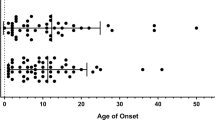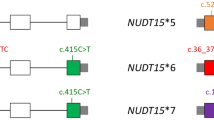Abstract
Biological therapy with anti-tumor necrosis factor-α (anti-TNF-α) monoclonal antibodies significantly increased the effectiveness of autoimmune disease treatment compared with conventional medicines. However, anti-TNF-α drugs are relatively expensive and a response to the therapy is reported in only 60–70% of patients. Moreover, in up to 5% of patients adverse drug reactions occur. The various effects of biological treatment may be a potential consequence of interindividual genetic variability. Only a few studies have been conducted in this field and which refer to single gene loci. Our aim was to design and optimize a methodology for a broader application of pharmacogenetic studies in patients undergoing anti-TNF-α treatment. Based on the current knowledge, we selected 16 candidate genes: TNFRSF1A, TNFRSF1B, ADAM17, CASP9, FCGR3A, LTA, TNF, FAS, IL1B, IL17A, IL6, MMP1, MMP3, S100A8, S100A9, and S100A12, which are potentially involved in the response to anti-TNF-α therapy. As a research model, three DNA samples from Crohn’s disease (CD) patients were used. Targeted genomic regions were amplified in 23 long-range (LR) PCR reactions and after enzymatic fragmentation amplicon libraries were prepared and analyzed by next-generation sequencing (NGS). Our results indicated 592 sequence variations located in all fragments with coverage range of 5–1089. We demonstrate a highly sensitive, flexible, rapid, and economical approach to the pharmacogenetic investigation of anti-TNF-α therapy using amplicon libraries and NGS technology.
This is a preview of subscription content, access via your institution
Access options
Subscribe to this journal
Receive 6 print issues and online access
$259.00 per year
only $43.17 per issue
Buy this article
- Purchase on Springer Link
- Instant access to full article PDF
Prices may be subject to local taxes which are calculated during checkout





Similar content being viewed by others
References
Atzeni F, Talotta R, Salaffi F, Cassinotti A, Varisco V, Battellino M, et al. Immunogenicity and autoimmunity during anti-TNF therapy. Autoimmun Rev. 2013;12:703–8.
Roberts RL, Barclay ML. Current relevance of pharmacogenetics in immunomodulation treatment for Crohn’s disease. J Gastroenterol Hepatol. 2012;27:1546–54.
Schnitzler F, Fidder H, Ferrante M, Noman M, Arijs I, Van Assche G, et al. Long-term outcome of treatment with infliximab in 614 patients with Crohn’s disease: results from a single-centre cohort. Gut. 2009;58:492–500.
Altwegg R, Vincent T. TNF blocking therapies and immunomonitoring in patients with inflammatory bowel disease. Mediat Inflamm. 2014;2014:e172821. https://doi.org/10.1155/2014/172821
Siegel CA, Melmed GY. Predicting response to anti-TNF agents for the treatment of Crohn’s disease. Ther Adv Gastroenterol. 2009;2:245–51.
Prieto-Pérez R, Almoguera B, Cabaleiro T, Hakonarson H, Abad-Santos F. Association between genetic polymorphisms and response to anti-TNFs in patients with inflammatory bowel disease. Int J Mol Sci. 2016;17:e225 https://doi.org/10.3390/ijms17020225
Horiuchi T, Mitoma H, Harashima SI, Tsukamoto H, Shimoda T. Transmembrane TNF alpha: structure, function and interaction with anti-TNF agents. Rheumatology. 2010;49:1215–28.
Taylor KD, Plevy SE, Yang H, Landers CJ, Barry MJ, Rotter JI, et al. ANCA pattern and LTA haplotype relationship to clinical responses to anti-TNF antibody treatment in Crohn’s disease. Gastroenterology. 2001;120:1347–55.
Hlavaty T, Pierik M, Henckaerts L, Ferrante M, Joossens S, van Schuerbeek N, et al. Polymorphisms in apoptosis genes predict response to infliximab therapy in luminal and fistulizing Crohn’s disease. Aliment Pharmacol Ther. 2005;22:613–26.
Leal RF, Planell N, Kajekar R, Lozano JJ, Ordás I, Dotti I, et al. Identification of inflammatory mediators in patients with Crohn’s disease unresponsive to anti-TNFα therapy. Gut. 2015;64:233–42.
Bek S, Nielsen JV, Bojesen AB, Franke A, Bank S, Vogel U, et al. Systematic review: genetic biomarkers associated with anti-TNF treatment response in inflammatory bowel diseases. Aliment Pharmacol Ther. 2016;44:554–67.
de Sousa Dias M, Hernan I, Pascual B, Borràs E, Mañé B, Gamundi MJ, et al. Detection of novel mutations that cause autosomal dominant retinitis pigmentosa in candidate genes by long-range PCR amplification and next-generation sequencing. Mol Vis. 2013;19:654–64.
Tan AY, Michaeel A, Liu G, Elemento O, Blumenfeld J, Donahue S, et al. Molecular diagnosis of autosomal dominant polycystic kidney disease using next-generation sequencing. J Mol Diagn. 2014;16:216–28.
Profaizer T, Coonrod EM, Delgado JC, Kumánovics A. Report on the effects of fragment size, indexing, and read length on HLA sequencing on the Illumina MiSeq. Hum Immunol. 2015;76:897–902.
Dames S, Chou LS, Xiao Y, Wayman T, Stocks J, Singleton M, et al. The development of next-generation sequencing assays for the mitochondrial genome and 108 nuclear genes associated with mitochondrial disorders. J Mol Diagn. 2013;15:526–34.
Li H, Durbin R. Fast and accurate short read alignment with Burrows-Wheeler transform. Bioinformatics. 2009;25:1754–60.
McKenna A, Hanna M, Banks E, et al. The Genome Analysis Toolkit: a MapReduce framework for analyzing next-generation DNA sequencing data. Genome Res. 2010;20:1297–303.
Van der Auwera GA, Carneiro MO, Hartl C, Poplin R, Del Angel G, Levy-Moonshine A, et al. From FastQ data to high confidence variant calls: the Genome Analysis Toolkit best practices pipeline. Curr Protoc Bioinform. 2013;43:11.10.1–33.
Ramos AH, Lichtenstein L, Gupta M, Lawrence MS, Pugh TJ, Saksena G, et al. Oncotator: cancer variant annotation tool. Hum Mutat. 2015;36:2423–9.
Hernan I, Borràs E, de Sousa Dias M, Gamundi MJ, Mañé B, Llort G, et al. Detection of genomic variations in BRCA1 and BRCA2 genes by long-range PCR and next-generation sequencing. J Mol Diagn. 2012;14:286–93.
Ozcelik H, Shi X, Chang MC, Tram E, Vlasschaert M, Di Nicola N, et al. Long-range PCR and next-generation sequencing of BRCA1 and BRCA2 in breast cancer. J Mol Diagn. 2012;14:467–75.
Jia H, Guo Y, Zhao W, Wang K. Long-range PCR in next-generation sequencing: comparison of six enzymes and evaluation on the MiSeq sequencer. Sci Rep. 2014;4:e5737. https://doi.org/10.1038/srep05737
Su Y, Lin L, Tian G, Chen C, Liu T, Xu X, et al. Preparing a re-sequencing DNA library of 2 cancer candidate genes using the ligation-by-amplification protocol by two PCR reactions. Sci China C Life Sci. 2009;52:483–91.
Prieto-Pérez R, Cabaleiro T, Daudén E, Ochoa D, Roman M, Abad-Santos F. Genetics of psoriasis and pharmacogenetics of biological drugs. Autoimmune Dis. 2013;2013:e613086. https://doi.org/10.1155/2013/613086
Dideberg V, Théâtre E, Farnir F, Vermeire S, Rutgeerts P, De Vos M, et al. The TNF/ADAM 17 system: implication of an ADAM 17 haplotype in the clinical response to infliximab in Crohn’s disease. Pharm Genom. 2006;16:727–34.
Ternant D, Berkane Z, Picon L, Gouilleux-Gruart V, Colombel JF, Allez M, et al. Assessment of the influence of inflammation and FCGR3A genotype on infliximab pharmacokinetics and time to relapse in patients with Crohn’s disease. Clin Pharmacokinet. 2015;54:551–62.
Mascheretti S, Hampe J, Kühbacher T, Herfarth H, Krawczak M, Fölsch UR, et al. Pharmacogenetic investigation of the TNF/TNF-receptor system in patients with chronic active Crohn’s disease treated with infliximab. Pharm J. 2002;2:127–36.
Mu W, Lu HM, Chen J, Li S, Elliott AM. Sanger confirmation is required to achieve optimal sensitivity and specificity in next- generation sequencing panel testing. J Mol Diagn. 2016;18:923–32.
Linares-Pineda TM, Cañadas-Garre M, Sánchez-Pozo A, Calleja-Hernández MÁ. Pharmacogenetic biomarkers of response in Crohn’s disease. Pharm J. 2018;18:1–13.
Rufini S, Ciccacci C, Novelli G, Borgiani P. Pharmacogenetics of inflammatory bowel disease: a focus on Crohn’s disease. Pharmacogenomics. 2017;18:1095–114.
Acknowledgements
This work was supported by the Foundation for the Development of Biotechnology and Genetics POLBIOGEN. S-EK is recipient of a fellowship for young researcher from Poznan Medical University (Poland) grant no 502–14–02223359–10715.
Author information
Authors and Affiliations
Corresponding author
Ethics declarations
Conflict of interest
The authors declare that they have no conflict of interest.
Rights and permissions
About this article
Cite this article
Walczak, M., Skrzypczak-Zielinska, M., Plucinska, M. et al. Long-range PCR libraries and next-generation sequencing for pharmacogenetic studies of patients treated with anti-TNF drugs. Pharmacogenomics J 19, 358–367 (2019). https://doi.org/10.1038/s41397-018-0058-9
Received:
Revised:
Accepted:
Published:
Issue Date:
DOI: https://doi.org/10.1038/s41397-018-0058-9
This article is cited by
-
Beyond assembly: the increasing flexibility of single-molecule sequencing technology
Nature Reviews Genetics (2023)
-
Variants of the CASP9 gene as candidate markers for primary response to anti-TNF therapy in Crohn’s disease patients
Journal of Applied Genetics (2023)
-
Molecular Genetic Techniques in Biomarker Analysis Relevant for Drugs Centrally Approved in Europe
Molecular Diagnosis & Therapy (2022)



